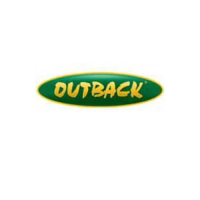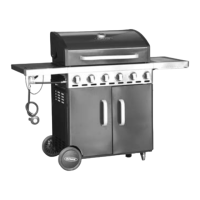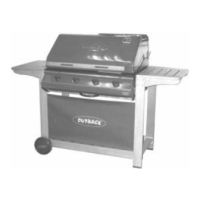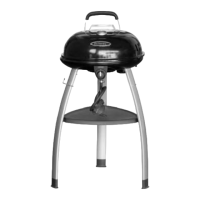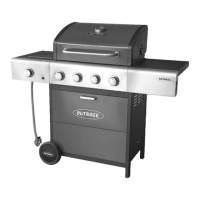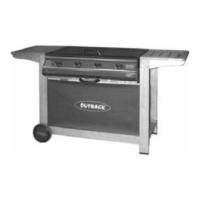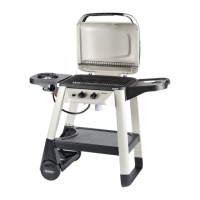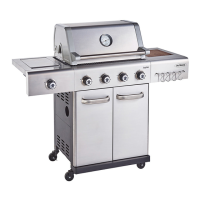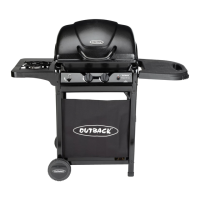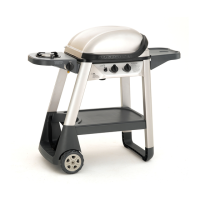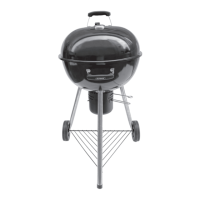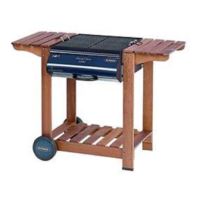position.
Close the hood to cook the food ‘indirectly’. Avoid lifting the hood unnecessarily as heat is lost every time the
hood is opened. If the hood is opened during cooking please allow extra time for the barbecue to regain its
temperature and complete the cooking. Use the temperature gauge (if applicable) to monitor the heat of the
barbecue.
If the internal heat becomes too high, turn the burners down to the low position. It is not necessary or advisable
to have all of the burners on high when the hood is closed.
DO NOT ALLOW YOUR BARBECUE TO OVERHEAT. Take care when opening the hood as hot steam can
be released on opening.
Warming Rack
Warming racks are a convenient way to keep cooked food warm or to warm items such as bread rolls. It is
advisable to place food (particularly fatty foods) to the front of the warming rack to avoid the possibility of juices
and fat running down the back of your barbecue. Always check that your warming rack is properly fi tted before
use.
Flare-Up Control
Flare-ups occur when meat is barbecued, and its fat and juices fall upon the hot fl ame tamer. Smoke of course
helps give food its barbecued fl avour, but it is best to avoid excessive fl are-up to prevent food being burned. To
control fl are-ups, it is ABSOLUTELY ESSENTIAL to trim away excess fat from meat and poultry before grilling,
use cooking sauces and marinades sparingly and try to avoid very cheap cuts of meat or meat products as
these tend to have a high fat and water content. Also, the burners should always be placed on the low setting
during cooking.
When fl are-ups do occur, they can usually be extinguished by applying baking soda or salt directly onto the
fl ame tamer. Always protect your hands when handling anything near the cooking surface of the barbecue and
take care to protect yourself from the fl ames.
If a fat fi re occurs, please see the instructions given below.
Fat Fires
Empty and clean the drip tray (and foil liner, if applicable) of food debris after each cooking session. If the
barbecue is to be used for large gatherings, it will be necessary to turn off and cool the barbecue every two
hours to remove food debris from the drip tray (and foil liner, if applicable) and clean it out. The time between
cleaning may need to be reduced if very fatty foods or cheap meat products are being cooked. Failure to do
this may result in a fat fi re, which may cause injury and could seriously damage the barbecue.
In the event of a fat fi re:
• If safe to do so, turn all control knobs to the ‘off’ position.
• Turn off the gas supply at the gas bottle.
• Keep everyone at a safe distance from the barbecue and wait until the fi re has burnt out.
• Do not close the hood or lid of the barbecue.
• NEVER DOUSE A BARBECUE WITH WATER. IF AN EXTINGUISHER IS USED, IT SHOULD BE A
POWDER TYPE.
• DO NOT REMOVE THE DRIP TRAY.
• If the fi re does not seem to be abating or appears to be worsening, contact your local Fire Brigade for
assistance.
End of Cooking Session
After each cooking session, turn the barbecue burners to the “high” position and burn for 5 minutes. This
procedure will burn off cooking residue, thus making cleaning easier. Make sure the hood is open during this
process.
Safety and Care Advice
4
